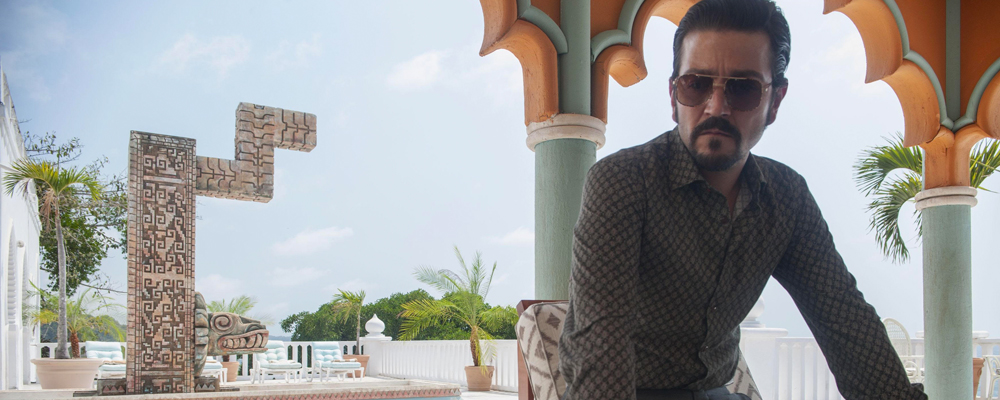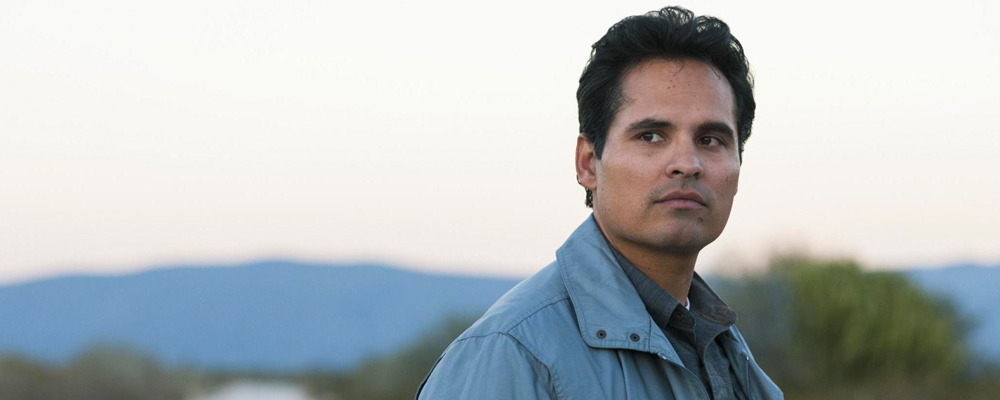Netflix’s ‘Narcos: Mexico’ Chronicles the Bloody Rise of the Guadalajara Cartel
Alci Rengifo
“Narcos: Mexico” is about the entrepreneurial spirit being practiced with bullets. It charts the rise of the modern cartel system in Mexico, which leads of course to the ongoing drug war. Fans of Netflix’s original “Narcos” series are getting a fresh change of geography with this first season of a new title. The first show chronicled the rise of Colombia’s Medellin drug cartel and its notorious leader, Pablo Escobar. Now we move further up, closer to the U.S. border, as a different crop of criminals form their own empire aided by a web of deep corruption.
The focus this time is on “The Godfather” of the Guadalajara Cartel, Miguel Ángel Félix Gallardo (Diego Luna), a former cop in 1980s Guadalajara who was attracted by the lucrative potential of the marijuana trade. For years the drug has been smuggled and sold in the United States, but grown and handled by a fractured array of growers and gangs, spread out over territories known as “plazas.” Gallardo decides to unite the various plazas into Mexico’s first ever drug gang union, but it’s a tough process. Everyone wants their cut, including the ultra-corrupt police. Gallardo gathers a core group of henchmen, including Rafa (Tenoch Huerta) and Don Neto (Joaquín Cosio). Sometimes they can be real hot-headed fools, but they’re loyal. Also arriving in the area is DEA agent Enrique “Kiki” Camarena (Michael Peña), who hopes to ascend but is soon disappointed by the shoddy work of his superiors, all of whom seem oblivious to the growing criminal enterprise right under their noses. As Camarena starts looking deeper into the world of Mexican drug smuggling, Gallardo’s power begins to grow, as well as the potential for violence and retribution.
“Narcos: Mexico” is in a quite strange sense educational. Since it is based on true events, what it charts dramatically is how Mexico’s cartels evolved into the massive set of criminal entities today holding such a grip on large swathes of the country. Gallardo is introduced early on as living through the first flashes of the modern drug war, as the Mexican government sends troops to burn marijuana crops. This gives him the idea that in unity there is strength, so it would make sense for the smugglers to simply form one grand network. Like many great crime stories, this one is gripping because of the details of the criminal’s vision. Gallardo could easily run a corporation or play with numbers in Wall Street, but fate has placed him in a world where ruthless advancement outside of the law guarantees success. He meets with the heads of the plazas, cuts deals and makes promises, then meets with crooked cops like Tomas Morlet (Horacio Garcia Rojas), who is prone to send hit squads if his cash envelopes suddenly feel lighter. Even crime done efficiently is hard work and much of the early episodes of “Narcos: Mexico” feel like capitalism in full swing. Everyone is working hard to make a profit, one mistake and it can all collapse.
But as with the first “Narcos,” the law enforcement angle also gets adequate space. Kiki is the show’s voice of conscience, as he battles first with being a Mexican in an office mostly dominated by white cops who know how it works down here in Mexico, even looking the other way at certain corrupt officials, but can’t process the scale of what Gallardo is trying to pull off. Kiki will attend barbecues with his colleagues, but he could care less about getting close to them. Like Gallardo he is dedicated, even to the detriment of his wife Mika (Alyssa Diaz). In one great episode Kiki sneaks into a caravan of field workers paid by the cartel to pick marijuana crops. Kiki easily blends in, but then a corrupt detective seems to spot him. What is particularly interesting about scenes like this, aside from the suspense, is the attention to detail. We get a true sense of just how this underworld operates, including in scenes where Gallardo discusses numbers and percentages. He is a quieter kingpin than the Pablo Escobar of the original show, with his Caribbean temper. While meeting with a Cuban coke dealer at a debauched party, Gallardo brushes away a woman who comes on to him. He is all about the business. “Narcos: Mexico” perfectly captures the culture of rural Mexico, of its country society and even accents (a rarity when it comes to Latin American depictions on American shows or movies). It was a wise move to again have the dialogue be mostly in Spanish, because we feel fully immersed in this world and time.
This show is also a gallery of memorable personalities. These characters have swagger, but they are not the exaggerated, overly stylish gangsters out of your typical Hollywood movie. Men like Escobar and Gallardo tended to be the definition of self-made. They quite literally came from nothing, with little to no education. What they had was a cunning sense of organization, fueled by a fierce greed. Diego Luna’s Gallardo is a quietly violent man, not prone to throwing tantrums but instead exerting his authority with a calm intimidation. It’s his henchmen who are essentially scrappy cowboys suddenly making millions a week. They race motorcycles through mansions, hit on rich girls at the nightclubs (one of them viciously turns down Rafa by mocking his clothes) and then go whack someone for Gallardo. Crime isn’t exactly romanticized or even made too flashy in this show, instead these thugs look like clueless, aimless minds who feel a part of a grand enterprise, albeit based on murder.
Fans of “Narcos” will surely enjoy “Mexico,” even if the main cartel boss is a bit more subdued. As we are entertained we also learn an interesting subterranean history. These men may seem brutish, violent and fueled by an immediate greed, but their exploits have a left mark Mexico and the U.S. are still dealing with. Diego Luna and the rest of the superb cast remind us that each of these criminals, like dictators, tend to be in a class of their own.
“Narcos: Mexico” season one premieres Nov. 16 on Netflix.



